
Stade Toulousain, also referred to as Toulouse, is a professional rugby union club based in Toulouse, France. They compete in the Top 14, France's top division of rugby, and the European Rugby Champions Cup.
The France national rugby union team represents the French Rugby Federation in men's international rugby union matches. Colloquially known as Le XV de France, the team traditionally wears blue shirts with a Gallic rooster embroidered on the chest, white shorts and red socks in reference to the French national flag. Les Bleus mostly play home matches at the Stade de France in Saint-Denis, near Paris. They compete in the annual Six Nations Championship along with England, Ireland, Italy, Scotland and Wales. France have won the tournament on 26 occasions, winning the Grand Slam 10 times.

Union Sportive Arlequins Perpignanais, also referred to as USA Perpignan or Perpignan, is a French professional rugby union club founded in 1933 and based in Perpignan, in the Pyrénées-Orientales department. They compete in the Top 14, France's elite division of rugby.
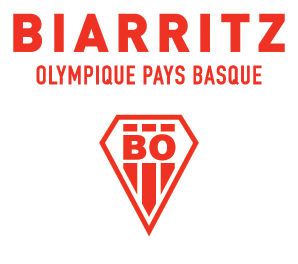
Biarritz Olympique Pays Basque, usually known simply as Biarritz, is a French professional rugby union team based in the Basque city of Biarritz, Nouvelle-Aquitaine which competes in the Pro D2, the second division of French rugby. Biarritz plays its home matches at the Parc des Sports Aguiléra, which is a multi-use stadium in Biarritz and which has a capacity of around 13,500 people, though for games that need a larger capacity, Biarritz may play at the Estadio Anoeta in San Sebastián. Biarritz play in red and white colours. Biarritz won a number of major honors, including the French championship on five occasions.

Club Athlétique Brive Corrèze Limousin, also referred to as CA Brive, Brive or CAB, is a French professional rugby union club based in Brive-la-Gaillarde, in the Corrèze department.
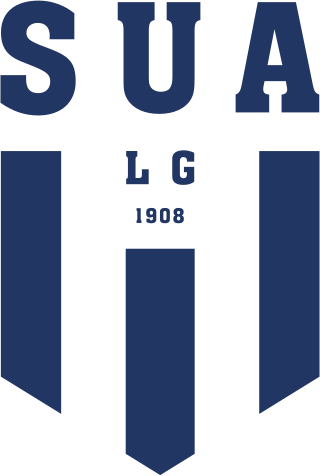
Sporting Union Agen Lot-et-Garonne, commonly referred to as SU Agen, Agen or SUALG, is a French professional rugby union club based in Agen, Lot-et-Garonne that competes in the Pro D2, France's second division of rugby.

Association Sportive Béziers Hérault, often referred to by rugby media simply by its location of Béziers, is a French rugby union club currently playing in the second level of the country's professional rugby system, Pro D2. They earned their most recent promotion as 2011 Fédérale 1 champions, but the club also won 11 Top 14 titles since its establishment in 1911.

Association Sportive Montferrandaise Clermont Auvergne is a French professional rugby union club from Clermont-Ferrand in Auvergne-Rhône-Alpes that currently competes in Top 14, the top level of the French league system. Clermont are two times French champions in 2010 and 2017. The rugby section is a part of a multi-sport club called AS Montferrand, which was founded in 1911 and adopted that name in 1919. Although the rugby section changed its name to the current ASM Clermont Auvergne in 2004, it is still frequently referred to as Montferrand both within and outside France.
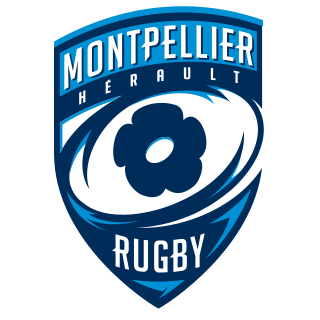
Montpellier Hérault Rugby (MHR) is a French professional rugby union club, based in Montpellier, Occitanie and named after the Hérault river. The club competes in the top level of the French league system, the Top 14. They originally played at Stade Sabathé but moved to the Stade Yves-du-Manoir, later known as Altrad Stadium, and since renamed the GGL Stadium, in 2007. They wear white and blue.
Philippe Georges Saint-André is a former French rugby union footballer and was most recently the manager of Top 14 side Montpellier. He earned 69 test caps for France between 1990 and 1997. His preferred position was wing but he could also play at centre. After retiring, Saint-André has found success as a rugby coach in both England and France. He was serving as director of rugby at Toulon before being announced as the successful candidate for head coach of France from 2011 to 2015. He formally took charge of the national team on 1 December 2011, and left his post on 17 October 2015 following a 13–62 loss to New Zealand.

Fabien Galthié is a French rugby union coach and former player, currently the head coach of the France national team.

Jean-Baptiste Élissalde is a former French rugby union player, playing either as a scrum-half or as a fly-half, and most recently defense coach for Montpellier in the Top 14.
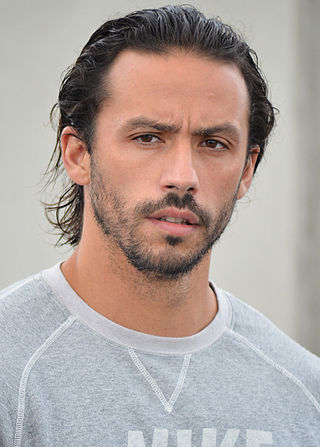
Clément Poitrenaud is a former French rugby union footballer. His usual position is at fullback but he also plays at centre. He most recently played for South African side the Sharks in Super Rugby, having represented Toulouse in the French Top 14 club competition between 2000 and 2016, and France between 2001 and 2012, including at the 2003 Rugby World Cup in Australia and the 2007 Rugby World Cup in France. He has since transitioned into a role of partner, father and coach.

Racing 92 is a French professional rugby union club based in the Hauts-de-Seine department, Paris' western inner suburbs that competes in Top 14. The club plays its home matches at the 30,681-capacity domed stadium Paris La Défense Arena, located near the La Défense business district.

Jean-Claude Skrela is a former coach of the French national rugby union team. His son, David Skrela, is a French rugby union player and his daughter, Gaëlle Skrela, is a professional basketball player.
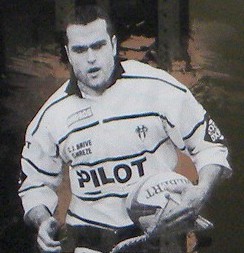
Alain Penaud is a French former rugby union player who held the position of fly-half.
The 2010 Heineken Cup Final was the final match of the 2009–10 Heineken Cup, the 15th season of Europe's top club rugby union competition. The match was played on 22 May 2010 at Stade de France, Saint-Denis north of Paris. It was contested by Biarritz and Toulouse, both from France. Toulouse won the final by 21–19, and for a record fourth time in fifteen seasons of the competition.

Racing Club de Narbonne Méditerannée is a French rugby union club that play in the third-level Nationale.

Jacques Brunel is a French rugby union coach and former player. He was most recently the French national team head coach, having previously been assistant coach for his nation and had led the Italian national team between 2011 and 2016. Brunel, who has spent most of his career in France, formally coached his former team Auch, as well as Bordeaux Bègles, Colomiers, Pau and Perpignan.
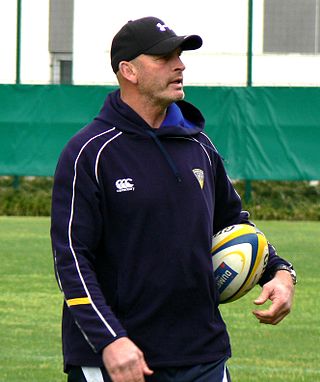
Vernon Anthony Cotter is a New Zealand rugby union coach and former player, who was most recently the head coach of the Fiji national team. He started his coaching career at Bay of Plenty including winning the Ranfurly shield for the first time in the union’s history He was part of the coaching staff for the successful Crusaders side between 2005 and 2006 winning 2 titles, before coaching in France with Clermont Auvergne between 2006 and 2014 coaching them to 6 finals and 2 titles including their first ever bouclier du Brennus coached the Scotland national team from 2014, including a quarter final at the 2015 Rugby World Cup, and left his role in May 2017 as his contract was not extended by the Scottish Rugby Union. In January 2020 Cotter was appointed coach of Fiji, but resigned in January 2023. He is currently coaching the Blues and coached them to the 2024 Super Rugby Pacific title.

















